A New Teacher’s Big List of All the Little Things
 By Frank Buck
By Frank Buck
(with thanks to Jenny Cheifetz)
Soon, all across America, brand-new teachers will be preparing classrooms for the very first time. Other teachers, some with significant years under their belts, are moving from one school and beginning again in another. Both groups face a learning curve, because every school is unique with its own procedures, traditions, and personalities.
So much to do, so much to learn, and the time is so short. What if the new teacher had a checklist to make induction more systematic and far easier? This article supplies that tool.
If you are a new teacher, or you know and care about someone who is, download and print the PDF. It’s a list of little stuff. But these little things add up to being “ready” when the first bell sounds. When you’re new to the job, being “ready” is a really big thing.
The People You Will Meet
Education is a “people” profession. If your initial year is successful, you will look back on it and remember specific people who helped make it so. Get to know them before you need them. Have you met, and began to form a good professional relationship with these people in your school?
- Principal
- Assistant principal
- Guidance counselor
- School psychologist
- Special education team
- Teachers at your grade level
- Professional development coordinator
- Union representative
- Administrative assistant (secretary and bookkeeper)
- Nurse
- Custodians
- Cafeteria staff
- Librarian/media specialist
- Specialist teachers: PE, Art, Music, Foreign language
- Aides
- Mentor teacher
- President of the PTA or PTO
- School board members (if your principal thinks it’s a good idea)
The Places You Will Find
You don’t have to spend the first week of school being lost. Take some time to acquaint yourself with your building. Do you know how to find each of the following places in your new school?
- Office
- Classrooms (Do you know where the other grade levels, wings, or pods are located?)
- Student bathrooms
- Staff bathrooms
- T
eachers’ lounge
- Media center
- Supply rooms
- Custodian’s office/custodian’s closet
- Cafeteria
- Auditorium
- Gymnasium/locker rooms
- Teachers’ work room (Copier, paper cutter, etc.)
- The door you should use for fire drills
- Where to stand during fire drills
The Equipment You Will Use
Some of the most stressful moments come when equipment does not work. Often, the fault is not with the equipment. The user hasn’t taken the time to earn how to use it. Do you know how to operate the following pieces of equipment in your new school? Taking time now will save time later.
- Copier (and any needed code)
- Computers
Network connections
- Projector and how it connects with the computer
- Document camera
- TV/DVD
- Laminator
- Paper cutter
- Fax machine
- Die-cut machine
- Spiral book maker
The Records You Will Keep
Record keeping is one of those peripheral areas that comes with the teaching profession. Doing great things for students is first and foremost. However, failure to handle the recordkeeping causes bottlenecks and can quickly make a teacher unpopular with coworkers. Do you know your responsibility in each of the following areas?
- Attendance and tardies
- Lunch count
- Cumulative records
- Report cards/progress reports
- Parent conference notes
- Phone conference records
- Professional development hours
- Sick day, professional day, funeral observance, etc. forms
- Expense reports
- Purchase orders
The Systems You Will Create
Simple systems make the classroom operate smoothly. Do you have a plan for preparing the following items?
Substitute folder
- Mailbox system for the students
- Portfolio system
- Creating classes in a learning management system
- Curriculum folders
- Lesson plans
- Gradebook
The Procedures You Will Follow
Every school operates differently. Soon, procedures will be second nature. Initially, you will have a great deal to learn. A good mentor will help you learn how your new school handles each of the following topics.
- Legal responsibilities (IEPs and 504 plans)
- Norms of the school
- How the day begins
- Transitions between classes
- Going to assemblies
- Daily dismissal
- Duties
- School discipline policy
- Procedures for sending students out of the room for discipline
- Allowing students to work in the room alone
- Allowing students to go to the media center or computer lab to work alone
- Policy for sending notes home
- Policy for when there are visitors to school (Do you send them to the office to sign in? Do they wear badges, etc.?)
Bus schedules and duties
- What to do with students who arrive to school early
- What to do with students who miss the bus home
- How to order supplies
- Procedures for using machines (Are there codes, specific times, aides who do the copying, etc.?)
- How to sign out audio-visual equipment
- How to sign out computer or tablet carts
- Procedures for rainy days
- How to get your paycheck or pay stubs
- Location of coffee and vending machines
- Procedures for emergency drills
- Procedures for attending conferences or seminars
- Required paperwork for yourself
- Required paperwork to send home to families
The Town Where You Will Teach
Are you new to the community? Explore your new surroundings. In particular, become familiar with attractions that will make living here more enjoyable.
- Location of district offices
- Location of other district schools
- Location of public library
- Location of nearby museums
- Location of movie theatres
- Location of teacher supply stores
The Contact Information You Will Need
When you need help, it is often only a phone call away. The question is whether or not you have the needed phone number at hand. Do you know contacting information for each of the following people or departments?
- School
- Principal
- Mentor
- Grade level partners
- Substitute line
- Human Resources department
- District office
- Payroll department
- PTA/PTO President and Committee
- Other staff members
- Parents of all students
- Do you need a code to call out from your classroom or the school?
The Learning Environment You Will Structure
The first day is approaching. Have you prepared the following items?
Bulletin boards
- Learning centers
- Classroom bookcases
- Name outside of door
- Class list outside of door
- Student name tags for desks, cubbies, locker area, or hooks
- Seating chart
- Schedule
- Sufficient desks and chairs
The Supplies You Will Need
Where to find a box of staples is a little thing. When the stapler runs out in the middle of a project, being able to locate where staples are stored becomes a big thing. Have you secured or know where to get the following supplies for you and the class?
- Plan book
- Gradebook
- Textbooks and teacher materials
- Attendance sheets
- Lunch count sheets
- School calendar (holidays, testing dates)
Keys to classroom, desk, filing cabinets, and closet
- Copy paper
- Lined paper
- Graph paper
- Construction paper
- Notecards
- Staplers and staples
- Transparency paper and markers
- Chart paper
- Erasers
- Tape and dispensers
- Sticky notes
- Paper clips
- White board markers and erasers
- Pens
- Pencils
- Manila file folders
- Hanging folders and plastic tabs
- Pocket folders
- Rubber bands
- Scissors
- Rulers
- Glue and glue sticks
- Crayons
- Markers
- Composition books
The Cooperation You Will Foster
Parents are your allies. You each play a role in helping young adolescents grow to be responsible adults. Do you have a plan for school-to-home communication?
- E
mergency forms
- Classroom rules and policies for discipline, homework, and grading
- State testing times and procedures
- Volunteer forms
- Field trip chaperones
- Email forms
- Newsletters
- Class website
- Homework website
- Voicemail
Little Things Are Big Things
You perhaps find nothing on this list to be difficult. The difficulty lies in thinking through all of the “little things” that add up to a successful start in a new place. Thankfully, you didn’t have to make the list.
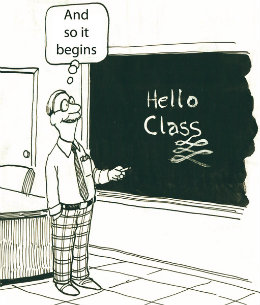
Because of the mobility of her family, Jennifer found herself “the new kid on the block” on a regular basis and having to adapt to new surroundings and new procedures. She told me, “I started to write a new teacher book but with small children, it never got finished.”
What she experienced by being the “new kid on the block” time and time again wound up being an appendix in my book. Modified and printed here, I hope it will help you or someone you care about as they navigate the waters in a new place.
A famous Alvin Toffler quote states, “You’ve got to think about big things while you’re doing small things, so that all the small things go in the right direction.” As you begin a new year in a new place, may all of the “small things” go in the right direction for you. May the little things you do to prepare for the day when the buses roll help you to accomplish the big things in your future.
Download a PDF of this article
See Frank’s latest edition of this list (2021)
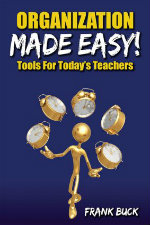


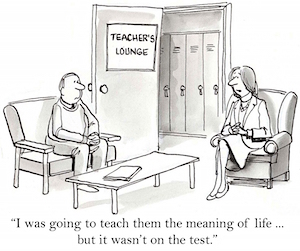
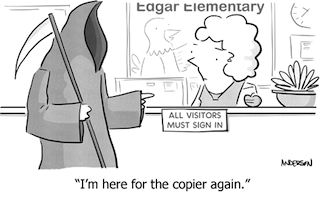

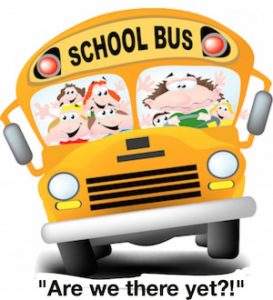
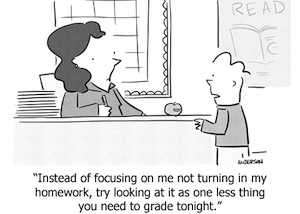
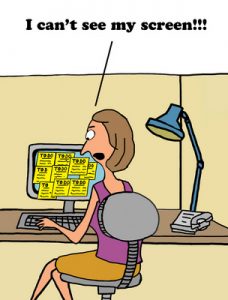
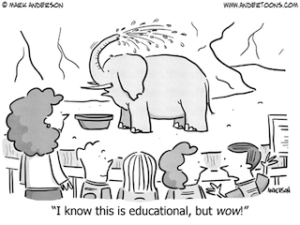






























Terrific Information! Thanks
I absolutely LOVE this post! I plan to tweet it to every teacher I know.
Terrific lists, Frank! Readers, see my review of Frank’s book Get Organized!: Time Management for School Leaders.
Breathe and keep a sense of humor. This needs to be added to the overwhelming list
Very informative. Thank you for providing the list.
Great list!!!